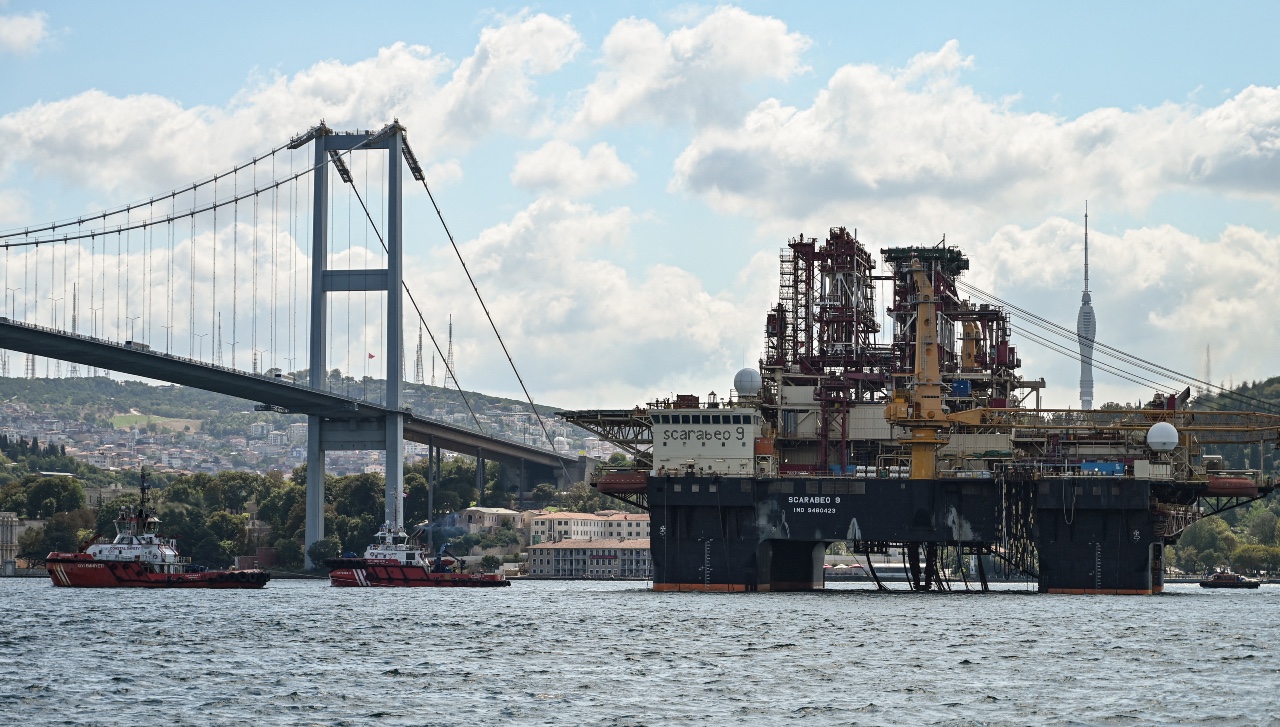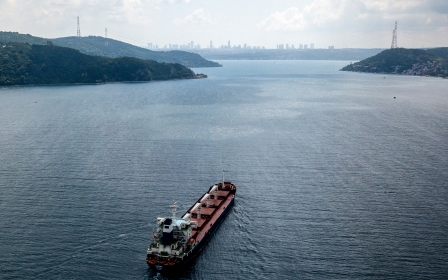'Someone has to blink:' Turkey's standoff with insurers triggers tanker logjam

A standoff between Turkey and maritime insurers showed no sign of easing on Friday, as a logjam of oil tankers in the Black Sea continued to grow, increasing the risk of disruptions in the global energy market.
“It’s clear we are in a standoff,” Neil Roberts, head of marine and aviation with the Lloyd's Market Association, told Middle East Eye. “The Turks want guarantees from the insurance industry that simply can’t be provided.”
“Someone is going have to blink,” he added. “I don’t think it’s going to be the insurers.”
On Monday, the G7, along with the European Union and Australia, imposed a cap on the price of Russian oil at $60 a barrel. The move is designed to allow the continued flow of Russian oil while limiting Moscow’s ability to profit from the sales.
Shippers will only be able to access insurance and other maritime services if the oil they carry is priced at or below the cap. The West believes it can pass the price ceiling onto Russian customers because most insurers are located in the EU and other G7 countries.
New MEE newsletter: Jerusalem Dispatch
Sign up to get the latest insights and analysis on Israel-Palestine, alongside Turkey Unpacked and other MEE newsletters
'Russia could look to disguise its crude as Kazakh crude'
- Svetlana Lobaciova, Gibson shipbrokers
Turkey is concerned the cap risks uninsured vessels transiting its waters.
Starting on 2 December, Ankara demanded that insurers prove vessels have full coverage in the case of a crash or oil spill, even if they are in breach of the price cap.
The type of coverage is known as protection and indemnity insurance, or P&I, and is a critical element in the regular transit of oil tankers across global seaways.
But the International Group of P&I Clubs, which provides insurance to 90 percent of the world’s shipping industry, has said it cannot comply, saying it goes “well beyond” the standard industry practice.
“Issuing a confirmatory letter under these circumstances would expose the Club to a breach of sanctions under EU, UK, and US law.”
Roberts said it is “absolutely not standard practice" for insurers to provide such a blanket guarantee. “What the Turks are effectively asking insurers to do, is cover ships even if they break the price cap.”
“Insurers can’t give unconditional promises of coverage. It is a precedent they don't want to set,” he added.
As a result, ships without a confirmation letter are prevented from entering the straits.
Turkish officials say about 15 million barrels of crude are waiting in the Black Sea, but shipping data compiled by Bloomberg predicts the number is much higher - about 25 million barrels.
Meanwhile, transit times for tankers to cross the Turkish straits from the Black Sea to the Mediterranean are at the highest in a year, hitting 10 days on 7 December, compared to three days at the start of the month, according to S&P Global Commodity Insights.
Shadow tankers
Turkey’s concerns, however, may not be unfounded, Svetlana Lobaciova, a senior market analyst at Gibson shipbrokers, told MEE
“Since spring, we have seen a huge increase in activity of sales and purchase of aging tankers. We believe a lot of those vessels are destined to trade Russian crude,” Lobaciova said.
"Insures can’t give an unconditional promises of coverage,"
- Neil Roberts, Lloyd's Market Association
Russia has likely assembled a shadow fleet of aging tankers to carry its crude outside of the western maritime system. Lobaciova says more tankers are going dark, a practice where vessels turn off their radio transmitter to avoid detection.
“Turkey is concerned about the shadow vessels that will ship Russian oil because they won’t have western world insurance. Russia has said it is not going to trade under the oil price cap,” Lobaciova said
“Sooner or later, this could lead to a disaster,” she said. “Tankers going dark with no one knowing what kind of insurance they have?”
Turkey is allowing some ships through. They just happen to be those covered by Russian insurers who have been willing to provide the blanket guarantee Ankara is demanding.
Kazakh or Russian oil?
More frustrating for western officials, the majority of ships blocked by Turkey are carrying oil from Kazakhstan, where western oil firms like Chevron, Exxon Mobil and Total are involved in operations.
Kazakh oil is exempt from the western price cap and sanctions. US officials have tried to ease their Turkish counterparts' concerns about insurance coverage.
On Wednesday, the US Treasury Deputy Secretary told Turkey’s Deputy Foreign Minister Sedat Onal that the price cap did not “necessitate additional checks on ships passing through Turkish territorial waters”, according to a statement from the Treasury.
Kazakh oil is shipped to Russia via the CPC pipeline owned by the Caspian Pipeline Consortium. It is then loaded on tankers at the Russian port of Novorossiysk.
While there is some mixing between Kazakh and Russian oil, each country’s crude receives its own certificate of origin. However, analysts say Russia’s control of Novorossiysk port could help it evade sanctions.
In November, Russia’s state-owned Lukoil said it would stop exports from its Caspian oil fields via the Baku-Tbilisi-Ceyhan (BTC) pipeline and divert them to the CPC line.
“Potentially, Russia could look to disguise its crude as Kazakh crude. There could be a lot of funny things happening at Novorossiysk,” Lobaciova said. “This is just one more thing that adds to the uncertainty.”
One positive for western countries is that the Turkish traffic jam has yet to impact crude prices. The international oil benchmark Brent traded at $76.77 a barrel on Friday, one of its lowest levels in 2022.
The logjam also underscores Turkey’s pivotal role in the Ukraine war. On Thursday, US Treasury Secretary Janet Yellen said Washington didn’t believe Russia was involved in Turkey's decision to block the vessels.
Turkey has sought to leverage its position in Nato to extract foreign policy wins. Ankara is blocking the Nato ascension bids of Sweden and Finland over what it says is their support for Kurdish militant groups. It also hopes to acquire new US-F-16 fighter jets.
While Ankara has supplied armed drones to Ukraine, it has also deepened economic ties with Moscow, buying more Russian crude.
Middle East Eye delivers independent and unrivalled coverage and analysis of the Middle East, North Africa and beyond. To learn more about republishing this content and the associated fees, please fill out this form. More about MEE can be found here.






